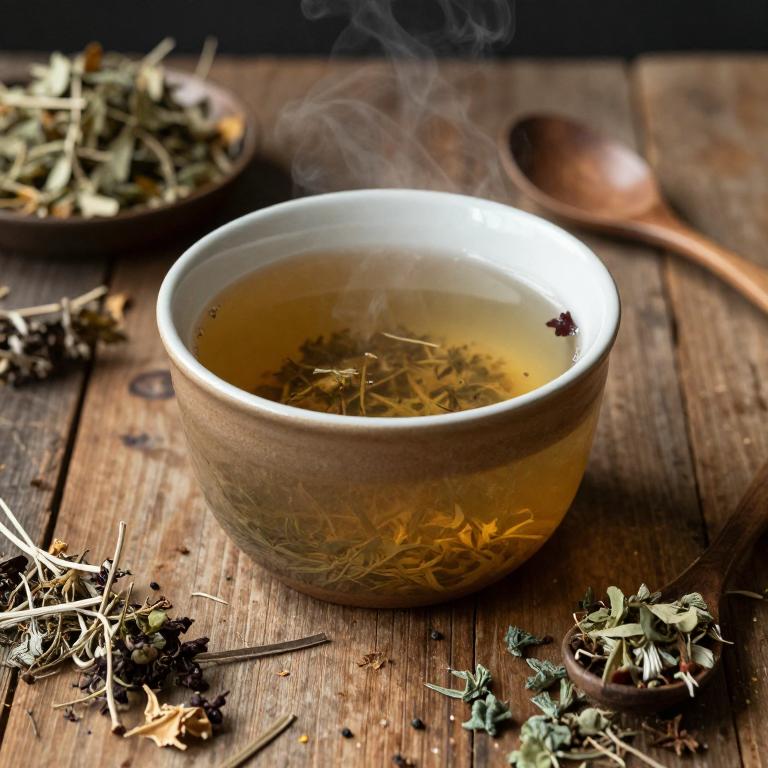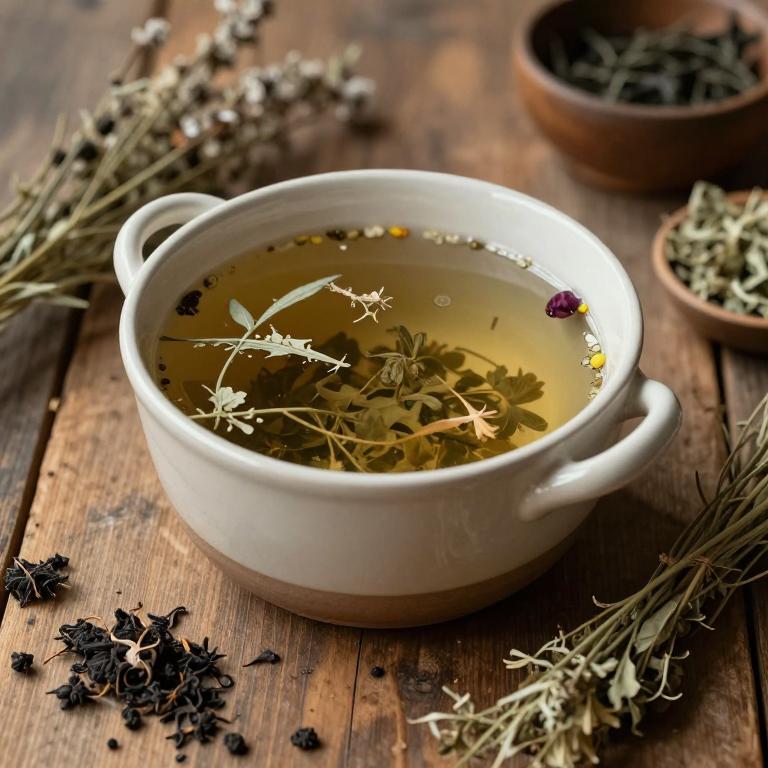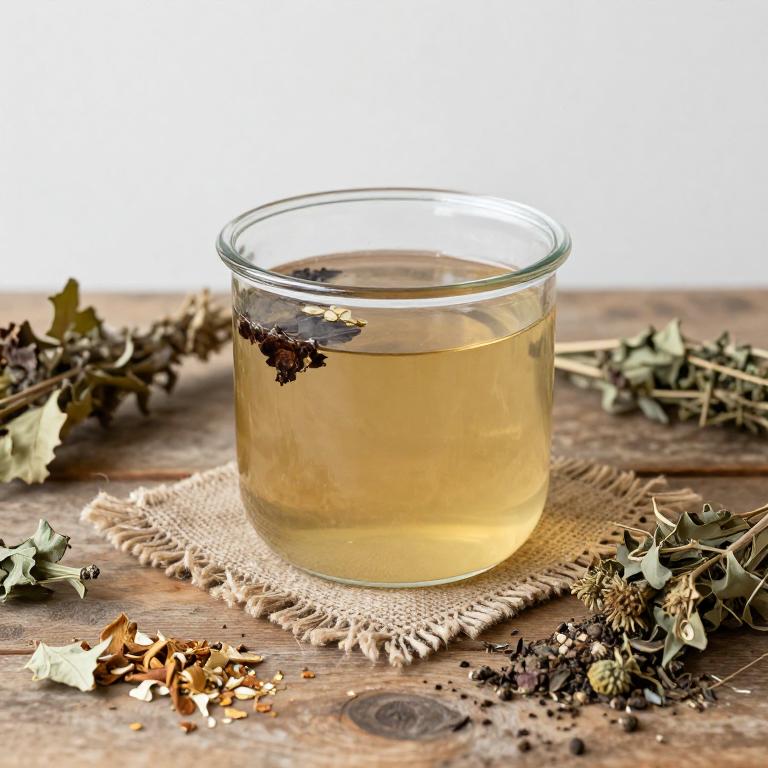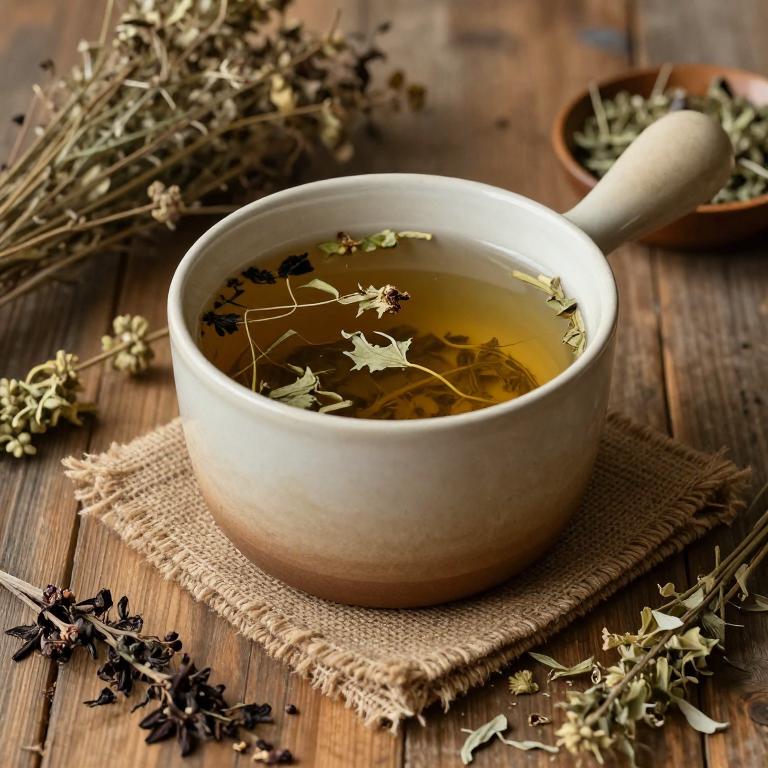10 Best Herbal Decoctions For Toothache

Herbal decoctions have been traditionally used to alleviate toothache by harnessing the anti-inflammatory and analgesic properties of various plants.
Common herbs such as clove, myrrh, and garlic are often included in these decoctions due to their natural pain-relieving and antimicrobial effects. To prepare a decoction, the herbs are typically simmered in water for several minutes, allowing the active compounds to dissolve into the liquid. This soothing liquid can be applied directly to the affected area using a cotton ball or swab, providing temporary relief from pain and reducing inflammation.
While herbal decoctions may offer some relief, they should not replace professional dental care, especially for persistent or severe tooth pain.
Table of Contents
- 1. Salvia (Salvia officinalis)
- 2. Black pepper (Piper nigrum)
- 3. Peppermint (Mentha piperita)
- 4. Ginger (Zingiber officinale)
- 5. Yarrow (Achillea millefolium)
- 6. Eucalyptus (Eucalyptus globulus)
- 7. Ceylon cinnamon (Cinnamomum zeylanicum)
- 8. Rosemary (Rosmarinus officinalis)
- 9. Cumin (Cuminum cyminum)
- 10. Ginkgo (Ginkgo biloba)
1. Salvia (Salvia officinalis)

Salvia officinalis, commonly known as sage, has been traditionally used in herbal medicine for its soothing and anti-inflammatory properties.
When prepared as a decoction, sage can help alleviate toothache by reducing inflammation and bacterial growth in the mouth. To make the decoction, dried sage leaves are simmered in water for several minutes, then strained and used as a mouth rinse or applied directly to the affected area. Its antimicrobial compounds, such as thujone and rosmarinic acid, contribute to its effectiveness in treating dental pain.
While sage decoctions can provide temporary relief, they should not replace professional dental care for persistent or severe toothaches.
2. Black pepper (Piper nigrum)

Piper nigrum, commonly known as black pepper, has been traditionally used in herbal medicine for its potent analgesic and anti-inflammatory properties.
When prepared as a decoction, the essential oils and alkaloids in black pepper can help alleviate toothache by reducing inflammation and numbing the affected area. To make the decoction, dried black pepper berries are simmered in water for several minutes, then strained and used as a mouth rinse or applied topically with a cotton swab. This natural remedy is believed to work by stimulating local blood circulation and blocking pain signals in the nerves.
While it may provide temporary relief, it is advisable to consult a dentist for persistent or severe tooth pain.
3. Peppermint (Mentha piperita)

Mentha piperita, commonly known as peppermint, has been traditionally used in herbal medicine for its refreshing and analgesic properties.
A peppermint herbal decoction can be prepared by steeping fresh or dried peppermint leaves in hot water, creating a soothing and aromatic infusion. This decoction may help alleviate toothache by reducing inflammation and numbing the pain due to its menthol content. The cooling effect of peppermint can also help relieve the discomfort associated with dental pain and reduce oral bacteria.
While it can provide temporary relief, it is not a substitute for professional dental care and should be used as a complementary remedy.
4. Ginger (Zingiber officinale)

Zingiber officinale, commonly known as ginger, has been traditionally used in herbal medicine for its anti-inflammatory and analgesic properties.
When prepared as a decoction, ginger can help alleviate toothache by reducing inflammation and soothing oral discomfort. To make the decoction, fresh ginger root is sliced and boiled in water for several minutes, then strained and consumed warm. This natural remedy is often used as an alternative or complementary treatment to conventional pain relief methods.
While ginger may provide temporary relief, it is advisable to consult a dental professional for persistent or severe tooth pain.
5. Yarrow (Achillea millefolium)

Achillea millefolium, commonly known as yarrow, has been traditionally used in herbal medicine for its anti-inflammatory and analgesic properties.
While it is not a primary treatment for toothache, some herbalists suggest using a decoction of yarrow to help alleviate pain and reduce inflammation associated with dental issues. To prepare the decoction, dried yarrow leaves and flowers are simmered in water for about 15 to 20 minutes, then strained and cooled. This herbal infusion can be used as a mouth rinse or applied topically with a cotton swab to the affected area.
Although yarrow may offer some symptomatic relief, it is important to consult a healthcare professional for proper diagnosis and treatment of toothache, as it may indicate a more serious underlying condition.
6. Eucalyptus (Eucalyptus globulus)

Eucalyptus globulus, commonly known as eucalyptus oil, has been traditionally used in herbal medicine for its analgesic and anti-inflammatory properties.
When prepared as a herbal decoction, it can be applied topically to the affected area to help alleviate toothache by reducing inflammation and numbing the pain. The active compounds in eucalyptus, such as eucalyptol, possess antimicrobial effects that may help combat dental infections contributing to tooth pain. To prepare the decoction, the dried leaves of eucalyptus globulus are boiled in water, and the resulting infusion is cooled before application.
While it may provide temporary relief, it is advisable to consult a dental professional for persistent or severe toothache, as it should not replace conventional medical treatment.
7. Ceylon cinnamon (Cinnamomum zeylanicum)

Cinnamomum zeylanicum, commonly known as cinnamon, has been traditionally used in herbal medicine for its potent antimicrobial and analgesic properties.
When prepared as a herbal decoction, cinnamon can help alleviate toothache by reducing inflammation and inhibiting the growth of bacteria that contribute to dental infections. To make the decoction, the bark of the cinnamon tree is boiled in water, allowing the active compounds such as cinnamaldehyde and eugenol to infuse into the liquid. This preparation can be applied topically to the affected area or used as a mouth rinse to soothe pain and promote healing.
While it may offer temporary relief, it is important to consult a dentist for proper diagnosis and treatment of persistent toothache.
8. Rosemary (Rosmarinus officinalis)

Rosmarinus officinalis, commonly known as rosemary, has been traditionally used in herbal medicine for its potential therapeutic properties, including its ability to alleviate toothache.
Rosemary contains essential oils such as rosmarinic acid and cineole, which possess anti-inflammatory and analgesic effects that may help reduce pain and inflammation associated with dental issues. A herbal decoction made from rosemary can be prepared by steeping fresh or dried leaves in hot water, creating a soothing infusion that can be applied to the affected area. This natural remedy is believed to improve circulation and reduce bacterial growth, potentially supporting oral health.
While rosemary decoctions may offer temporary relief, they should not replace professional dental care for persistent or severe tooth pain.
9. Cumin (Cuminum cyminum)

Cuminum cyminum, commonly known as cumin, has been traditionally used in herbal medicine for its potential soothing properties.
When prepared as a herbal decoction, cumin may help alleviate toothache by reducing inflammation and promoting oral hygiene. The decoction is typically made by boiling the seeds in water and then using the infused liquid for gargling or applying it directly to the affected area. While some anecdotal evidence supports its use, scientific studies on its efficacy for toothache are limited.
As with any herbal remedy, it is advisable to consult a healthcare professional before using cumin decoctions for persistent dental pain.
10. Ginkgo (Ginkgo biloba)

Ginkgo biloba, known for its neuroprotective properties, has also been explored for its potential in alleviating toothache through herbal decoctions.
These decoctions typically involve boiling the leaves of the ginkgo tree to extract its active compounds, such as flavonoids and terpenes, which are believed to have anti-inflammatory and analgesic effects. Some traditional Chinese medicine practitioners use ginkgo biloba decoctions as a complementary treatment to reduce gum inflammation and relieve tooth pain associated with dental infections or periodontal issues. However, it is important to note that while anecdotal evidence suggests possible benefits, scientific research on its efficacy for toothache remains limited.
As with any herbal remedy, it is advisable to consult a healthcare professional before using ginkgo biloba decoctions, especially for persistent or severe tooth pain.